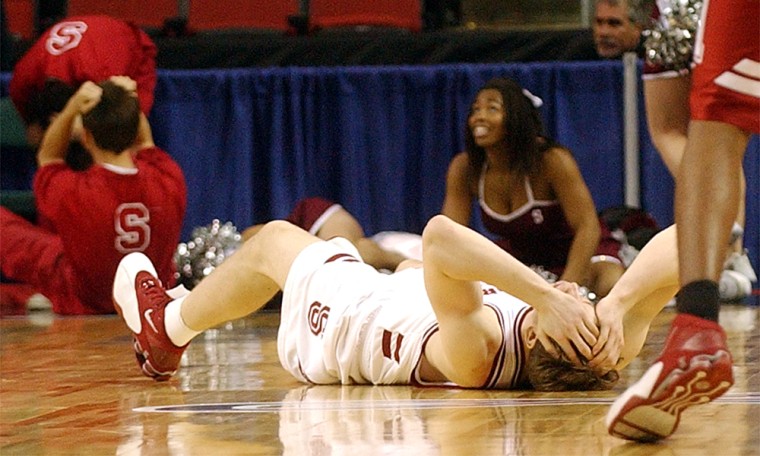It could have been North Carolina State's Engin Atsur, pulling up from the left side, well outside the three-point arc. Except Atsur's shot, after the Wolfpack wasted 15 seconds, was blocked by Vanderbilt, and fell hopelessly short.
It could have been Dan Grunfeld, saving Stanford. It might have been D.J. Strawberry, boosting Maryland. Two rounds of the NCAA tournament have passed, and the most prominent element of the event thus far is what's missing.
Bryce Drew, where are you?
"It's coming," Saint Joseph's Coach Phil Martelli said.
Okay, but when? The NCAA tournament is defined by buzzer-beaters. The one Drew launched for Valparaiso that beat Mississippi in 1998 comes to mind. So does Christian Laettner's catch-turn-and-shoot-all-in-2.1-seconds routine for Duke over Kentucky a dozen years ago.
Less prominent -- but equally memorable -- were John Wallace for Syracuse over Georgia or Richard Hamilton for Connecticut over Washington or Drew Nicholas for Maryland over UNC Wilmington. But they happened.
This year, nothing. All that's required is One Shining Moment. What do you do if you don't have any?
"For every buzzer-beater," said Joe Zappulla, producer of CBS's "One Shining Moment" montage, "there is the reverse side."
Perhaps, then, 2004 is the anti-tournament, March Mundaneness. The opening line of that CBS post-championship music video is, "The ball is tipped . . ." So far, that means the ball is tipped, and it falls off the rim. Ten times over the weekend, players had last-second shots to win or tie. Ten times, they missed.
On paper, it should be working out fine. Eleven of the 32 first- and second-round games were decided by three or fewer points -- one possession. That ties the 2003 tournament for the most since 1990, when there were 14.
"By now," Wake Forest Coach Skip Prosser said, "you just expect it."
But to this point, it hasn't happened.
"I just couldn't get it to fall," was the best explanation Strawberry had about his last-second shot that would have forced overtime with Syracuse. Strawberry had the shot because, well, he had missed one a few seconds earlier, and was grabbing his own rebound.
"He didn't have much of a look," was how Texas-El Paso Coach Billy Gillispie explained why guard Chris Craig missed the game-tying three-point attempt two days earlier, allowing the Terrapins to hang on.
That's all that's happened so far. The shots just didn't fall, the kids didn't have much of a look.
"Just look at some of highlights," Martelli said. "The kid from [Alabama-Birmingham] throwing the 85-foot pass over his head. The dunk from the kid from Oklahoma State. The wraparound pass that [Illinois guard] Dee Brown threw. There's an awful lot of action."
Just not the action.
Zappulla's task, it would seem, would be growing more difficult, brick by brick. He can't exactly rename the tune, "No Shining Moments." It's gotten such that CBS is considering doing a piece on all those shots that have fallen astray.
"I don't know if there's going to be a buzzer-beater," Zappulla said. "Maybe there's not going to be one. But you know what? There's going to be something."
Wake Forest guard Chris Paul said he sat in class yesterday, dreaming of the possibility of hitting one of those shots. "It's overwhelming," the freshman said.
Paul saw a buzzer-beater drop over the weekend. Virginia Commonwealth's B.A. Walker buried a running three-pointer against the Demon Deacons in a first-round game last Thursday as the horn sounded. The problem? The Rams were down by four. Buzzer beaten, opponent not.
So it has been that in those final seconds, in all manners. Kentucky's Fitch got a good look at a three-pointer against Alabama-Birmingham, and the shot simply didn't fall. Washington's Brandon Roy had little alternative but to heave an 80-footer with the Huskies down by two and time expiring against UAB. He missed. BC's Jermaine Watson was open enough for what would have been a tying three-pointer against Georgia Tech -- a possession after the Eagles had thrown away a pass when they were down by one.
But often, these plays haven't even been executed properly. Atsur's heave, tipped by Vanderbilt's Scott Hundley, was one example, for the Wolfpack had plenty of time to get a better shot and didn't. Saturday, with North Carolina trailing Texas, sharp-shooting Rashad McCants took the ball on the right wing, pump faked, tried to get away from a defender. He couldn't, and launched anyway.
Air ball.
"It just didn't go in," McCants said.
Worse, the Tar Heels trailed by three. McCants's foot was clearly inside the arc.
"We needed a miracle shot," Coach Roy Williams said.
Not to mention three miraculously blind officials.
Saturday afternoon, senior guard Michael Crotty got the ball, trailing by two with two-tenths of a second remaining. He hurled the ball three-quarters of the court. The shot hit the front of the rim, then the back, then -- what else this year? -- fell out.
Didn't see it? Oh. Crotty plays for Williams College, which by that margin fell to Wisconsin-Stevens Point in the Division III national championship game. Apparently, it happens in the Little Dance, too.
"There's one word that defines, 'One Shining Moment,' " Zappulla said. "That's 'emotion.' We can have emotion without a buzzer-beater."
But it would help.
"It's coming," Martelli said, "and everybody's got to be ready for it."
